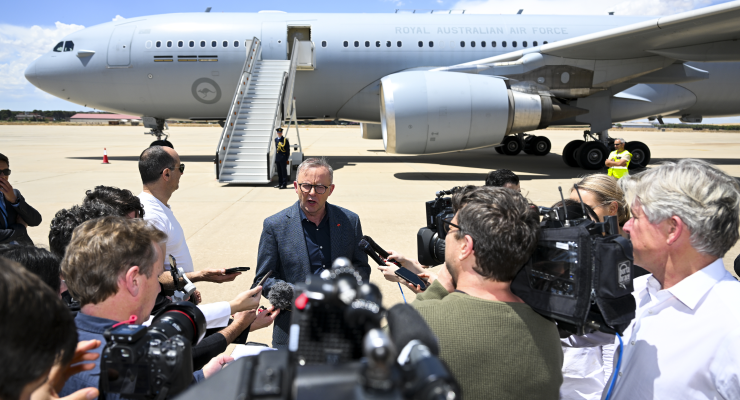
Why is the prime minister in Spain for a NATO summit? What good is Australia there?
Anthony Albanese says we’re the largest contributor to Ukraine outside NATO, which is a bit like boasting of the tallest building in the southern hemisphere.
As it turns out, Albanese is there because NATO wants us, along with the other members of what is dubbed the “AP 4” — Japan, South Korea and New Zealand — as “Asia-Pacific partners”. The partnership involves “political dialogue and practical cooperation in several areas, including cyberspace, new technology and countering disinformation”.
Bluntly, “the rise of China” is identified as an issue for consideration in the partnership. No white paper-style pussyfooting around there.
Australia plays an important role for NATO in relation to Ukraine beyond sending Bushmasters and other aid. Information gathered by the US via Pine Gap is crucial to US espionage on Russian military communications. Unusually, the US possessed both high-quality intelligence about Russia’s attack on Ukraine and used it very effectively to warn of it and develop an international response in anticipation of it.
That was quite a contrast to France’s military intelligence service, which badly let down Emmanuel Macron, who was insisting until the eve of the attack that Russia wouldn’t do it. Macron promptly, and not unreasonably, sacked the head of his Direction du Renseignement Militaire. You don’t embarrass Monsieur le Président globally and live to tell the tale.
That’s all very well for Australia to be helping via Pine Gap, which makes us a target in the event of a nuclear conflict, but Albanese shouldn’t be attending just for a pat on the back. The primary driver for Australia must be “the rise of China”. Albanese has already, unprompted, identified the relationship between Russia and China as an issue that “reinforces the need for us to be engaged”.
Beyond cultivating NATO’s interest in the Asia-Pacific and the information-sharing and coordination that will bring, the main priority for Albanese is to get the relationship with France fully back on track.
France has more than a million citizens in its Pacific territories, and its own exclusive economic zones in the region. Of European countries, it alone has an Indo-Pacific strategy, which covers, inter alia, its military presence in the region, its dispatch of forces from the French homeland, and its cooperation with Australia and the US (and, Rainbow Warrior notwithstanding, New Zealand).
But Macron’s main interest with China is economic and protectionist, and his resistance to unbalanced access to markets — especially around investment. As recently as a year ago, Macron was backing the now-dumped EU-China investment deal.
France is a great power, and part of an even greater power in the EU, and so can afford to be more sanguine about any threats from China.
Getting back to good standing with France is thus a top priority for Australia after Scott Morrison idiotically trashed the relationship in the quest for a good headline about nuclear submarines.
Despite some silly coverage about allegedly “overpaying” Naval Group for abandoning the subs contract, Albanese’s decision to quickly put that issue to bed was wise. So is his decision to visit the Élysée Palace to continue repairing relations with Macron while in Europe.
A France engaged in the Pacific, positively disposed towards Australia and grateful for our support for NATO’s core objectives in Europe, will do far more to complicate China’s Pacific engagement plans than any putative nuclear submarine arriving in 2055.
Albanese’s meeting with Macron shouldn’t be the last step in restoring the Franco-Australian relationship. It should be the next of many more.








If I remember correctly, admiral Barrie ( retired.) has stated repeatedly that China poses no military threat to Australia. Read Brian Tooheys recent piece on who the real bully is in the pacific and it ain’t China. Hugh White says engage with them. Every knowledgeable diplomat says the same. The whole basis of this Chinaphobia is not based in reality. IMHO. Steve Carey.
Absolutely!
Well done, Bernard, to note the important geographic and human interests held in this region by France – the only EU power, member of the UN Security Council and nuclear power to be so. Our partnership with the French should never have been ditched by the Morrison-Dutton vandalship.
And, Russia. You forgot them.
Is this Clickbait? I mean Albanese is going to Paris after this and anyway, wouldn’t Macron also be in Madrid?
It is useful for Albo to meet NATO leaders. France only has three Pacific territories, New Caledonia, French Polynesia and Waliis and Futuna. Total population below 600000. Other territories in the Caribbean and Indian Ocean would make 1 million.
Certianly useful to work with Macron in the Pacific.
The Caribbean ‘departments‘ – NOT territories, integral parts of la belle France verite – voted overwhelmingly for Le Pen 60/40% in the 2nd round but were even more overwhelmingly in favour of Melenchon in the first round.
IOW, ABM – anyone but Macron.
Bonnie’s homeland of Corsica was 58.3% for LePen.
French Polynesia – ie Tahiti + voted similarly to mainland France but New Caledonia and Waliis and Futuna were 2/1 for the Macaroon.
Yes, we do indeed need to remember, Russia is a Pacific country with its military base in Vladivostok. France is also a key Pacific player with around a million citizens and multiple territories. The UK? Well, they have Pitcairn island and it’s 50-60 residents (outsourced to alter New Zealand to administer), oh, and it’s AUKUS arrangement (whatever that actually is) to tie it to our part of the globe.